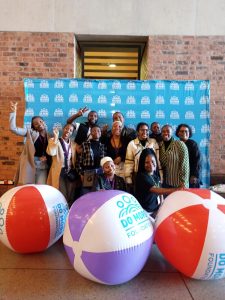DoMore in collaboration with the Durban University of Technology’s (DUT’s) Department of Consumer Sciences, Food, and Nutrition recently undertook a groundbreaking initiative to support the well-being of children in Hammarsdale, Durban. This joint effort provided DUT students with the opportunity to extensively engage with 50 Early Childhood Development (ECD) centres.
The primary objective of this partnership was to provide comprehensive training and support to the staff of these centers, ultimately promoting nutrition and child health.
Over the course of three days, DUT students played a pivotal role in bringing to life the idea that ECD centres can serve as hubs of nutrition and child health in South Africa. The students delivered onsite training sessions at the centers, covering a wide array of topics essential to child nutrition and health. The training encompassed key aspects such as malnutrition basics, emphasising the causes and consequences of malnutrition, as well as preventive strategies such as growth monitoring that were easy to implement at community level with the support of scales and training. This practice education opportunity allowed for application and exposure to early childhood development that is instrumental in raising awareness among the students and ECD centre staff, empowering all those that were involved to effectively screen for and address malnutrition within a community context.
A significant focus was placed on growth monitoring, with the students conducting both theoretical and practical sessions. Equipping the participants with essential skills, they emphasised the accurate tracking of children’s growth and development using tools like the Road to Health Book (RTHB). Conducting an audit of the RTHB enabled the identification of any gaps or missing information, ensuring that each child’s growth trajectory was properly documented. An ECD audit was also conducted which provided DO MORE with useful baseline indicators regarding the ECD centres facility and staff driving a strong evidence base for future development and empowerment initiatives.
The students extended their support into other critical areas such as kitchen safety, emphasising the promotion of a safe environment for food preparation, while highlighting proper hygiene practices among kitchen staff. Waste management strategies were discussed, advocating for sustainable practices and the reduction of food waste. Additionally, the students underscored the significance of Water, Sanitation, and Hygiene (WASH) practices, with particular emphasis on proper handwashing techniques. By instilling good hygiene habits in both children and staff, they aimed to foster a healthier environment. The students were carriers of core messages based on the Nutrition Guidelines for ECD programmes recommended by the Department of Health. Involving the ECD staff and kitchen staff in this process fostered a sense of ownership and collaboration, promoting sustainable nutrition practices within the centres.
Through their active engagement with the ECD centers, the DUT students effectively demonstrated the immense potential of ECD centres to be ideal hubs for sharing nutrition messages and monitoring child health in the Hammarsdale community. By combining their resources and expertise, DoMore and DUT’s Department of Consumer Sciences, Food, and Nutrition are playing their part to create a better tomorrow for young children. Extending the collaboration, students participated in the DoMore MANDELA DAY celebration at RCL head office in Durban, packing almost 600 boxes of essentials for the ECD centres.
Pictured: DUT’s Department of Consumer Sciences, Food and Nutrition students during their DoMore inservice learning.
Iris Naidoo


